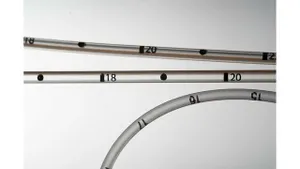Zero tolerance for mediocrity
May 1, 2006
|
The people at Dymotek have found that the easiest way to achieve total customer satisfaction is by totally satisfying one another.
Imagine a shop where every operator on every shift can shut a press down, rather than allowing it to produce bad parts. Picture a manager sitting down with employees and letting them decide how much time off they need.
Think of a place where management helps to foot college tuition bills for its employees, or where management even helps dissatisfied employees find other jobs. Better yet, imagine a shop where managers say things like this:
“In a well-run company you could take the management staff out and no one would notice—the most important people are the people at the press.â€
You might think a company practicing such progressive management principles would tank in record time. But the managers at such a company are comfortable with their conservative expectations of 20% growth this year. It’s a privately held custom molding operation in Ellington, CT called Dymotek.
In a promotional flyer, Dymotek summarizes its customer satisfaction policy by saying that it has “zero tolerance for providing mediocre service.†Management sources say Dymotek exceeds its customers’ expectations by exceeding the expectations of its employees.
Pyramid flipping
Dymotek began in 1992 as Truebro Inc., a company created by the Trueb brothers, Steven and Thomas. Ellington natives, both grew up working in their father’s pattern-making shop, gaining experience in the CNC machining of dies, fixtures, and jigs.
With a homemade mold and a 200-ton Toyo/Maruka press, Truebro molded and manufactured a very successful series of proprietary, ADA-compliant undersink covers. It had no competition. In a few years it grew from a two-machine shop to one with 10 machines, molding not only proprietary parts 24/7, but also custom molded parts.
When they began to encounter the hassles of shipping the proprietary products to huge mega stores like Lowe’s and Home Depot, the Trueb brothers sold out the products to a larger firm, though they continue to manufacture parts and manage the business. Their sights set on custom molding, they created Dymotek.
Just about everyone at the company credits the lion’s share of Dymotek’s management style and manufacturing successes to Normand Forest, operations manager. They say it was Forest who flipped the traditional organizational pyramid upside-down and made it work.
Stop the presses
Forest brought more than 20 years’ worth of hands-on molding experience to the company and the Trueb brothers leave him ample room to practice it.
“I tell our people that if they see something wrong, just open the door and stop the press from running. I believe in promoting self-discipline,†Forest says, adding that a company-wide profit-sharing program that will be instituted this year is an added incentive.“I’ll ask our people, ‘Isn’t it worth it to shut the machine down instead of seeing someone sweeping up that scrap? That’s money out of your pocket.’
“We shut down the plant twice a year for training. Sometimes our operators themselves call for training—when we bring in a new material, for instance, or a new machine, like our new two-shot Arburg.â€
Holistic HR
Get this: Dymotek has no HR department. “A standard human resources department . . . what are they dealing with? Compensation? Benefits?†asks Victor Morando, project manager. “Here, management is involved with the continuous improvement of our people—that’s the best way to continually improve our products. Senior management only consists of five people, including our project manager, Charu Chhibber; Normand Forest; Lynn Crane, our controller; Wayne A. Smith, our quality manager; and myself. We manage as a team. All of us are involved in human resource issues. We all make sure our people enjoy their jobs.â€
Dymotek’s senior managers practice continuous improvement, as much as the folks on the floor. For example, Morando introduced the management team to a DISC training program supplied by Target Training International (Scottsdale, AZ) to help them improve the quality of life around the shop, and to improve the company’s sales and service effectiveness by better understanding their own behavior as managers.They’re also willing to invest in systems to help them keep a closer eye on the results of their inverted-pyramid management style, shot-after-shot. Dymotek recently installed ERP software from IQMS (Paso Robles, CA).
“It’s awesome!†says Chhibber. “We’re so totally satisfied with it. It’s so extensive and powerful, and it streamlines our workflow. We’re now looking to hire or promote someone to be our IQMS specialist.â€
A winning reputation
Dymotek completed a 20,000-ft² expansion last year. The story behind that story was that Thomas Trueb was the architect and that he designed the expansion with input from everyone in the shop.
Finding people has never been a big problem for the company. Chhibber says the company recently wanted to hire more local people and held an open house. It posted a small “Employment Opportunities†sign outside the plant and ran an advertisement in the local newspaper that listed six or seven available positions.
“We only had 50 application forms,†Chhibber says. “They were all gone.â€
What cinched it for Chhibber herself was learning more about the company’s management style when she stopped to chat with the Dymotek folks at its OEM New England trade show booth a couple of years ago. “I wanted to be a part of the team,†she says. Apparently, so do Dymotek’s customers.
Caring about caring
“Our ties with our customers are so close . . . we have a deep understanding of each other’s business. But it’s more than just that. We go the extra mile,†Chhibber says. “Our whole company is our customer service department.â€
“It’s not just about being the lowest person in the bucket when it comes to quoting on jobs. Of course, we still have to be price competitive,†Morando says. “Quoting is a given. But, it goes beyond that. Believe it or not, we’ve found that it’s how we deal with each other internally that makes the real difference.â€
“I’ve never seen a customer come back to us and say, ‘We’re giving the business to someone else, because they’re cheaper,†says Chhibber.“In fact,†Morando adds, “we’ve had more than one instance when our customer contacts leave their companies and, almost immediately, they contact us to supply their new businesses. Maybe it’s because they know we actually care whether or not we care enough about our customers.â€
The biggest challenge
Dymotek’s confidence in its management practices enables the company to tackle challenging high-precision/high-volume work. A 3-ppm reject rate reportedly is typical with its larger customers.
Some of its jobs include Class 10,000 medical micromolding. Others include 300-position connectors.
Many of its jobs often involve high-performance engineering thermoplastics, like PSU, PEI, PPS, and LCP. And Dymotek’s sights are now set on adapting to new technological challenges, like two-shot LSR overmolding and automation.
But Morando says Dymotek’s biggest challenge isn’t necessarily precision molding challenging parts. “Our biggest challenge is keeping our people trained.â€
Dymotek fast facts |
Contact information |
You May Also Like








